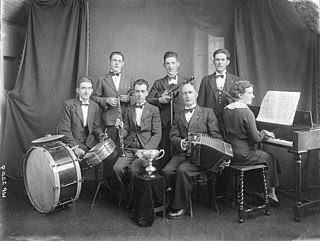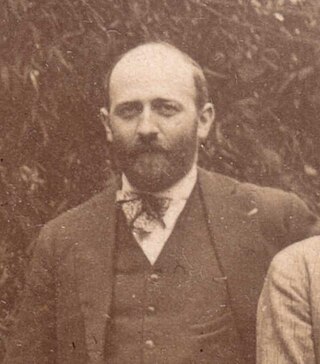
Louis Joseph Andriessen was a Dutch composer, pianist and academic teacher. Considered the most influential Dutch composer of his generation, he was a central proponent of The Hague school of composition. Although his music was initially dominated by neoclassicism and serialism, his style gradually shifted to a synthesis of American minimalism, jazz and the manner of Stravinsky.

A septet is a formation containing exactly seven members. It is commonly associated with musical groups but can be applied to any situation where seven similar or related objects are considered a single unit, such as a seven-line stanza of poetry. In jazz, a septet is any group of seven players, usually containing a drum set, string bass or electric bass, and groups of one or two of the following instruments, guitar, piano, trumpet, saxophone, clarinet, or trombone. See, for example, Miles Davis, and Chick Corea's 1984 album, Septet.
Pierre Max Dubois, sometimes given as Pierre-Max Dubois was a French composer of classical music, conductor, and music educator. He was a student of Darius Milhaud, and though not widely popular, was respected. He brought the ideas of Les Six, of which his instructor was a member, into the mid-1900s. This group called for a fresh artistic perspective on music. The music of Dubois is characteristically light hearted with interesting harmonic and melodic textures.

Charles-Louis-Eugène Koechlin, commonly known as Charles Koechlin, was a French composer, teacher and musicologist. Among his better known works is Les Heures persanes, a set of piano pieces based on the novel Vers Ispahan by Pierre Loti and The Seven Stars Symphony, a 7 movement symphony where each movement is themed around a different film star who were popular at the time of the piece's writing (1933).

La Création du monde, Op. 81a, is a 15-minute-long ballet composed by Darius Milhaud in 1922–23 to a libretto by Blaise Cendrars, which outlines the creation of the world based on African folk mythology. The premiere took place on 25 October 1923 at Théâtre des Champs-Élysées in Paris.
Arnold Atkinson Cooke was a British composer.
Concertino is the diminutive of concerto, thus literally a small or short concerto.
Stanley Walker Hollingsworth was an American composer and teacher. He was a student of composer Darius Milhaud from 1944–46, and of Gian Carlo Menotti from 1948–50. As a composer he is probably best known for his operatic trilogy of children's stories: "The Mother", "The Selfish Giant", and "Harrison Loved his Umbrella".

Leopold "Leo" Smit was a Dutch composer, murdered during The Holocaust at the Sobibor extermination camp.
Anatol Vieru was a Romanian-Jewish music theoretician, pedagogue, and composer. A pupil of Aram Khachaturian, he composed seven symphonies, eight string quartets, concertos, and chamber music. He also wrote three operas: Iona (1976), Praznicul Calicilor (1981), and Telegrame, Tema si Variatiuni (1983). He was awarded the Herder Prize in 1986.

Alexis Fernand Félix Jean Rivier was a French composer of classical music in the neoclassical style.
Bruce Mather is a Canadian composer, pianist, and writer who is particularly known for his contributions to contemporary classical music.
Sean Hickey is an American composer and record label executive, born in 1970 in Detroit, Michigan, and currently based in New York. In 2022, he was appointed Managing Director of Pentatone.
In music, a decet—sometimes dectet, decimette, or even tentet—is a composition which requires ten musicians for a performance, or a musical group that consists of ten people. The corresponding German word is Dezett, the French is dixtuor. Unlike some other musical ensembles such as the string quartet, there is no established or standard set of instruments in a decet.

The trumpet repertoire consists of solo literature and orchestral or, more commonly, band parts written for the trumpet. Tracings its origins to 1500 BC, the trumpet is a musical instrument with the highest register in the brass family.
Jean Perrin was a Swiss composer and pianist. He composed in a neo-classical style, sometimes approaching polytonality, and his music shows the influence of Stravinsky and Poulenc.
The Sonatina for Violin and Harpsichord is a three-movement, neoclassical chamber work composed by Walter Piston in 1945, that marks the beginning of his postwar style.
The bassoon repertoire consists of pieces of music composed for bassoon as a principal instrument that may be performed with or without other instruments. Below is a non-exhaustive list of major works for the bassoon.






